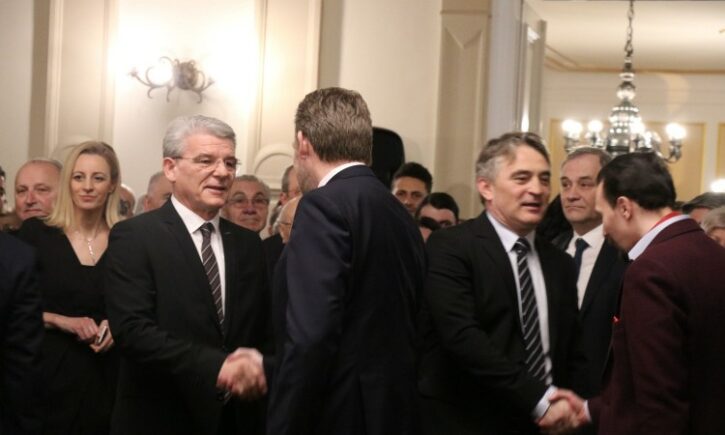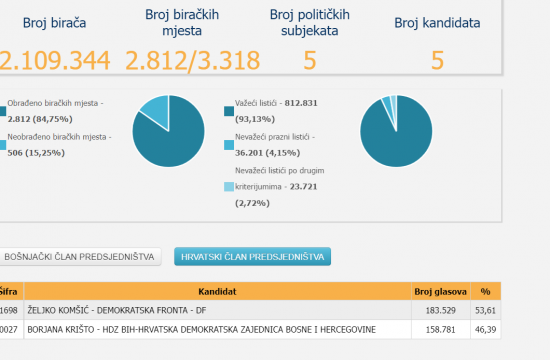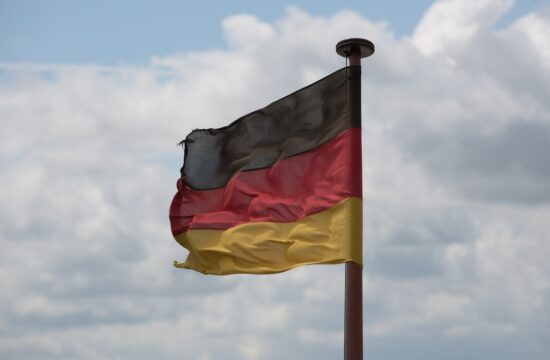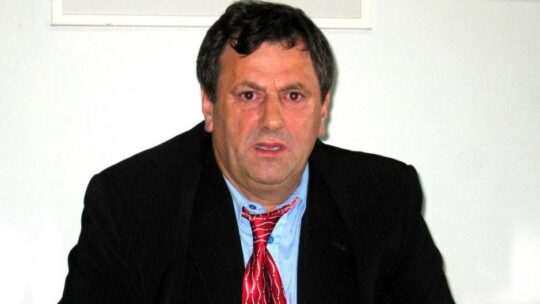
The traditional reception on the eve of Bosnia’s Independence Day was again hosted only by the Bosniak and the Croat members of the tripartite presidency on Thursday, while the Serb member chose to spend the evening in Belgrade, where he marked the day when the Serb-majority part of the country adopted its first Constitution.
Apart from the two Presidency members and numerous officials and diplomats, the Head of the EU Delegation in Bosnia, Lars-Gunnar Wigemark, the head of Bosnia’s Islamic Community, Husein Effendi Kavazovic, Bosnia’s Archbishop Vinko Puljic and the head of the Jewish Community, Jakob Finci, attended the reception.
“The dates of February 29 and March 1 will always remain written down in our history as the days when most of the citizens of this country voted for an independent Bosnia and Herzegovina,” said Zeljko Komsic, the Bosnian Croat presidency member, in his speech.
Bosnia held a referendum on independence from Yugoslavia on February 29, 1992, after Slovenia and Croatia left the joint country.
Bosniaks and Croats overwhelmingly voted in favour, while Bosnian Serbs, who preferred to stay in the then Serb-dominated Yugoslavia, boycotted the vote.
As the result showed that the majority of those who voted opted for independence, Bosnia declared the next day, March 1, that it seceded from Yugoslavia.
Bosnian Serbs rebelled the decision which triggered a war that took some 100,000 lives and ended in 1995 with a peace agreement that divided the country along ethnic lines.
Their current leader, Milorad Dodik, has for years been advocating Serb secession.
Komsic said Bosnians should remember and keep repeating the referendum question because it is “a reminder to what kind of country its citizens wanted, and I believe they wanted it still today.”
“Are you in favour of a sovereign and independent Bosnia and Herzegovina, a state of equal citizens, peoples of Bosnia and Herzegovina – Muslims, Serbs, Croats and members of other peoples who live there?” the people were asked 27 years ago.
Although most Bosnians answered the question affirmatively, “we paid a high price, and, unfortunately, suffered huge losses,” Komsic said, adding that in the end “we managed to, together, defend ourselves from those who tried to undermine the independence, integrity and sovereignty of our country.”
“Unfortunately, that battle for our country as was described in that referendum is still ongoing, and it seems, with a higher intensity than ever,” Komsic warned.
He defined Bosnia as a country composed of different identities, but then again having its own “identity of centuries-long tolerance and life together.”
“That is how it was, how it is now, and how it will, despite everything, stay,” he stressed, adding that Bosnia’s future is within the European Union and NATO.
Komsic’s Bosniak colleague, Sefik Dzaferovic, said that nearly two-thirds of Bosnia’s citizens voted for independence and at the same time “against greater-state policies which were on the scene with a clear plan to divide Bosnia and Herzegovina.”
“We have successfully overcome the most difficult of all of those challenges, the aggression which took place after the independence was declared,” he said.
Dzaferovic said the sacrifices made to achieve such a Bosnia obligate its citizens to maintain and build up the country.
He said that new challenges await Bosnia, “destructive political forces,” some of which “are trying to achieve their unfulfilled wartime goals,” and are “becoming louder.”
He blamed those who still insist on the dissolution of the country for the instability and constant crisis that slows the economic growth and makes young people leave.
He insisted that those forces will not prevent Bosnia from joining NATO and the EU.
The behaviour of those destructive forces “brings nothing good to anyone in this country, especially to those in whose name it is being conducted,” he said.
“That is why it is necessary for all politicians to stop their negative rhetoric and destructive moves and for all of us to turn toward a constructive dialogue based on truth and justice, mutual respect, respect for the rule of law, European standards and cooperation among all of our peoples,” Dzaferovic concluded.




